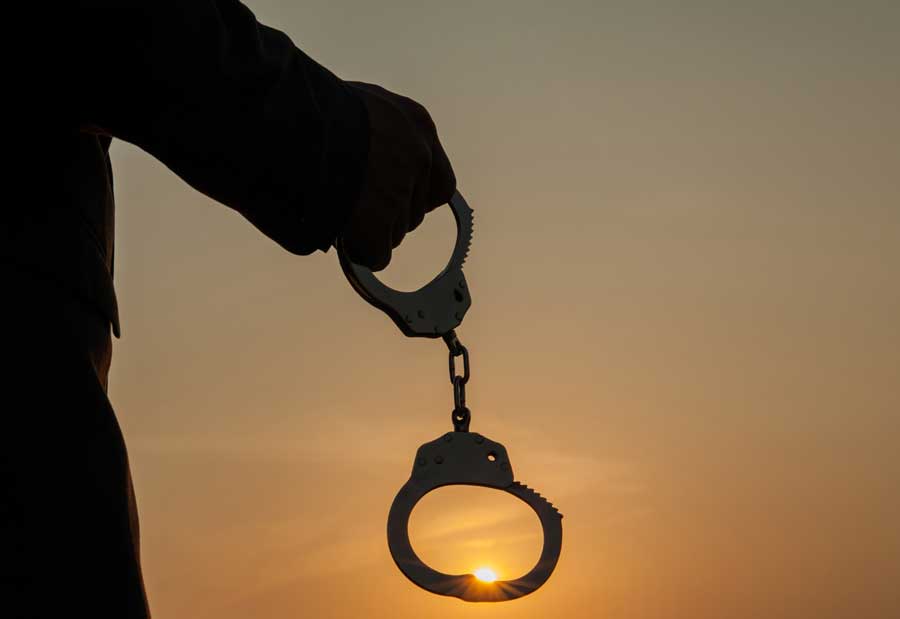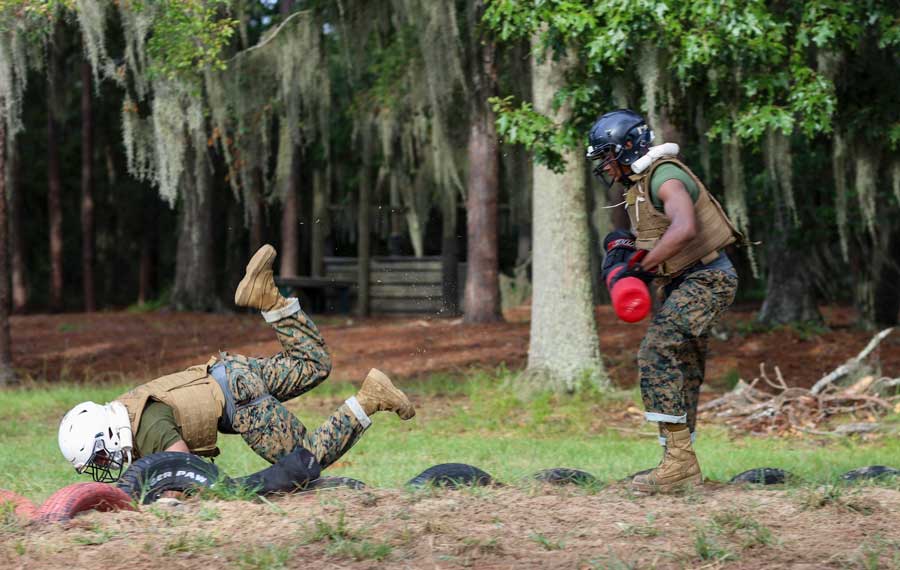I Thought the Marine Corps Would Offer a Better Life. It Was Another Place I Didn’t Belong.
Editor’s Note: This story was published in partnership with San Quentin News and was written during a writing seminar for incarcerated veterans in April hosted by The War Horse at California’s San Quentin Rehabilitation Center. Tens of thousands of military veterans are incarcerated across the United States, and these stories are intended to shine a light on their unique needs, challenges, and experiences. Learn about the seminar here.
The first dead body I ever saw was my mother’s. It was Aug. 8, 1968, a perfect, sunny Thursday in an area of Brooklyn, New York, called Gunsmoke.
I played for hours in the fresh, clean air before going back home and finding my mother slumped over a chair. At first, I thought she was asleep. I reached out and grabbed her arm. Nothing. I tried shaking her. Still nothing. Her body, I noticed, was cold and stiff to the touch.
I was nine years old. I couldn’t comprehend that my mother was really gone. I would never feel safe again.
More than five decades later, I still don’t know how my mother died, although I believe my father knew more than he ever revealed.
He never cried. Not at the discovery of her body or at the funeral or the burial. Weeks later, a woman I’d seen working in one of the neighborhood restaurants moved in with us. They carried on as if nothing out of the ordinary had happened. Except now my father acted differently toward me—distant and cold—and this confused me.
The new woman was nice to me at first. But a month after her arrival, that changed. I began to view her as my angry, devious, evil stepmother.
When my sister Cynthia, one year older, was sent to live with a well-off family, I begged them to take me too. But I was left alone, like an abused, unwanted dog.
I ran away and waded into the unmerciful reality of street life. It was my refuge. At first, I stole food just to survive. Then my thievery escalated into stealing valuables from stores and selling the merchandise for money. I was an easy recruit for one of the neighborhood drug dealers. He gave me a bicycle and a pair of large white gloves, similar to mittens, filled with bags of heroin called “China White.” My job was to ride the bike back and forth down Lenox Avenue until he gave me the signal to meet him inside one of the buildings. Then he’d come in and take the bags of China White he needed.
That old thug pocketed thousands of dollars a day while I took home $20 or $25. I saw those around me getting robbed, stabbed, locked up, or some combination of the three. I watched them become drug addicts, and I feared all of these things happening to me.

Donald Edge joined the Marines because he wanted to make a big change in his life. But life in the military in the mid-1970s was one more experience he had to survive. (Canva stock photo)
I knew I needed to make a change in my life—something big. I had failed to find safety in my own home or on the streets. I decided to look for it in the military.
As I walked downtown in lower Manhattan one day, I passed a military recruiting office. A Marine recruiter called me over, and we went inside to talk. I was mesmerized by the photos on his walls, by his dress blue uniform, by the title United States Marine.
The Marines are the first to land and the last to leave, read one sign. The Marines are amphibious, the only military branch that travels via air, land, and sea. I didn’t know what the word “amphibious” meant. But I liked the sound of it. I needed to become amphibious.
Award-Winning Journalism in Your Inbox
That recruiter pretty much promised me the world, and I believed everything he told me. At 17, I needed my father’s consent to enlist. I told the recruiter that I hadn’t seen him in a couple of years and anyway, he’d be too busy to sign his consent.
“No problem,” the recruiter told me. “I’ll sign it for you.”
But, he said, I could never tell anyone.
On July 15, 1975, I headed to the airport. I’d never been on a plane before, and I was scared, but I put on a brave face. I got off the plane in Beaufort, South Carolina, and proceeded to the section I was supposed to report to.
Three Marine Corps drill instructors began yelling and screaming at me right there in the airport. I was shocked, afraid, angry, and unable to comprehend—for at least the second time in my life—what was happening. But mostly, I was embarrassed in front of all those people watching, some laughing.
I wanted to turn around and go back to New York, and I would have, but I had no money. I suddenly understood why they’d told us not to bring any money with us. We were taken outside and told to board a raggedy school bus bound for Parris Island.
I’d heard of racism, but I’d never experienced it directly. Yet I quickly noticed that the darker your complexion, the worse you got treated, and I was happy when I noticed two other guys darker than me.
During basic training, platoons engaged in numerous competitions against each other. I won all of my fights, even against some guys who were a lot bigger than me. But one day my platoon lost a pugil stick fight competition, a kind of martial art that uses large, padded sticks. The drill instructors punished me more than the white soldiers. I felt angry and disrespected.

Donald Edge performed well in pugil stick competitions like this one at Marine Corps Recruit Depot in Parris Island, South Carolina, yet he said he was never recognized for his accomplishments. (Photo by Lance Cpl. Samuel Fletcher, courtesy of the Marine Corps)
The men of other races whose overall performance was far lower than mine were consistently treated better. Although I almost always outperformed them, I never received any recognition. It felt intentional; my anger grew into periods of rage.
Back then, Marine Corps drill instructions got away with beating up new recruits and bestowing excessive punishment when they lost a challenge. Yet the mental damage was far worse. I built up an emotional wall around myself—what I called psychological defenses—that hid what I was feeling.
After basic training, I headed to Camp Lejeune in North Carolina to train as a field artillery specialist. I specialized in the 105mm Howitzer, and I learned to shoot and operate a “four deuce” mortar. My precision in blowing up any target was outstanding, and I regularly outperformed my crew members.
The best crew was always called Base Peace—I was the only Black Marine in the otherwise all-white group. Most of the white Marines did not want a Black man on that crew, and because it was an elite group, I was disliked by other white Marines who wanted to be part of it. I also felt like I was being laughed at by the Black Marines for always being on Base Peace.
I felt like I didn’t fit anywhere.
Our Journalism Depends on Your Support
I also wasn’t getting promotions like other Base Peace Marines. Once, after catching crabs from one of the girls in town, I got medication from the military doctors who told me not to go to the field. My battery gunnery sergeant made me go anyway. I felt singled out again.
Throughout my tour, I was subjected to incidents like these over and over again.
I didn’t view these experiences as traumas. Yet from the vantage point of time and prison, I can see how these events affected my judgment. My anger festered, compounded what I’d endured as a child.
I drank alcohol excessively, used drugs, and began committing crimes.
The Marine Corps had not been an escape. I did not find belonging or safety within its ranks.
I wonder how my life would have evolved if I had.
This War Horse reflection was written by Donald Edge, edited by Kristin Davis, and copy-edited by Mitchell Hansen-Dewar.





Comments are closed.